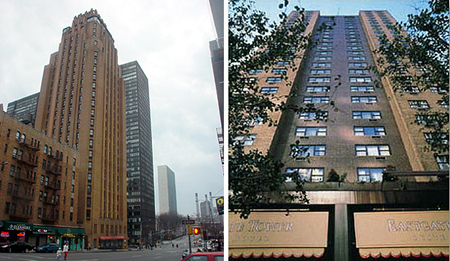 Lenders and investors are feuding over control of the Beekman Tower Hotel (left) and the Eastgate Tower Hotel (right).
Lenders and investors are feuding over control of the Beekman Tower Hotel (left) and the Eastgate Tower Hotel (right).Equity investors are feuding with lenders over control of two East Side Midtown hotels purchased as a package for more than $100 million in late 2006, a recent lawsuit shows, highlighting the divergent interests within real estate partnerships in a down economy.
The two hotels were bought by an investment entity called Peninsula Real Estate Fund I, created by Dublin-based Anglo Irish Bank and investors led by longtime hotel executive Timothy Haskin, formerly a managing director with Tishman Hotel.
The complex dispute between the equity fund and the Anglo Irish Bank originated with the purchase of the two hotels. The 172-room Beekman Tower Hotel at 3 Mitchell Place at the corner of First Avenue and 49th Street and the 187-room Eastgate Tower Hotel at 222 East 39th Street between Second and Third avenues were purchased for a total of $135 million in October 2006, city property records show.
The owners’ plans included rehabilitating the two properties, adding hotel rooms and branding the Eastgate with a national chain, the lawsuit filed in New York State Supreme Court July 1 says. But those plans have been stalled by infighting over renovation plans, the filing notes.
“Almost from its inception, the partnership has been mired in disputes [between the parties] concerning the cost and scope of renovations to [the] hotels, the role of Anglo in the partnership and misrepresentation made to the equity investors,” the suit says. “The disputes have effectively prevented the partnership from completing the intended plans.”
Reports at the time said the properties were expected to be rehabilitated before the end of 2008.
The equity fund says in the filing that the bank blocked a 2007 effort to refinance the project through Swiss lender UBS that would have netted the investors a 50 percent return in one year, underscoring the competing interests of the parties.
The suit was filed by equity investor group Peninsula Real Estate Fund I GP, the general partner in the ownership entity, Peninsula Real Estate I Fund. The general partner group is led by Haskin, who serves as its president. The other partner is Mainland Ventures, an entity controlled by Anglo Irish Bank, the complaint says.
Mainland Ventures controls two out of three seats on the investment committee of Peninsula Real Estate Fund I, and wants to take over the third seat, now controlled by Peninsula Real Estate Fund I GP, in order to break the impasse over rehabilitation, the complaint says.
The suit seeks to block alleged attempts by the lender to take full control of the properties. But it also seeks to disclose the identity of the other equity partners as well as stop the lender from sending out monthly updates which Haskin’s group says are false.
The parties are in negotiations, and there has been no change in the investment committee structure, said Ronald Lefton, an attorney with Greenberg Traurig, which is representing Peninsula.
The parties in the dispute declined or were not available for comment.
John Fox, senior vice president at hotel advisory firm PKF Consulting, who was not familiar with the dispute, said the environment for rehabilitating a hotel is far different today than in the strong economy of 2006.
“Right now room rentals are down 30 to 40 percent from last year. It changes all the economics,” he said.